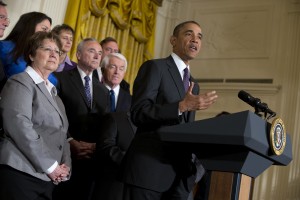
President Barack Obama gestures while speaking about immigration reform, Tuesday, June 11, 2013, in the East Room of the White House. Bolstered by support from Obama, a landmark immigration bill passed a pair of crucial test votes Tuesday in the US Senate, kicking off weeks of debate on the comprehensive reform. AP PHOTO/EVAN VUCCI
WASHINGTON—Bolstered by support from President Barack Obama, a landmark immigration bill passed a pair of crucial test votes Tuesday in the US Senate, kicking off weeks of debate on the comprehensive reform.
After months of initial wrangling and more than 100 new amendments offered to the underlying legislation, the Senate—in an act of broad bipartisanship—voted 84-15 to move to debate passage of what would be the most important immigration reform in nearly 30 years.
“This overwhelming vote, a majority of both parties, starts this bill off on just the right foot,” said Democratic Senator Chuck Schumer, one of the Gang of Eight senators—four Democrats and four Republicans—who crafted the measure, which now comes to 1,076 pages.
Republican Jeff Flake, also an author of the bill, told AFP the votes marked “a good start (but) we have a long way to go,” citing potential roadblocks over border security issues and acknowledging what may be an uphill climb to pass similar legislation in the House of Representatives.
The top Democrat in the Senate, Harry Reid, has said he hopes to pass the bill by early July.
The legislation provides a 13-year pathway to citizenship for the more than 11 million people living illegally in the United States, tightens border security, and aims to collect back taxes from undocumented workers.
It also would revise visa programs for high-tech employees and agriculture workers, require firms to use an e-verify program that prevents illegal hires and compel those receiving provisional legal status to learn English.
Obama made an outspoken pitch for the bill Tuesday, saying those opposed to it are insincere about fixing a badly broken system.
The president has gently pushed the bill from behind the scenes for months, fearing his open support would swell the ranks of conservatives who see the bill as offering amnesty to illegal immigrants and are determined to kill it.
But ahead of the crucial test votes, Obama waded into the fray, leveraging the political capital on the issue he won during last year’s election campaign, particularly among Hispanic voters.
The president sought to disarm conservative Republicans—even some who support immigration reform—who argue that the bill should not be passed without tough new border security measures.
“If passed, the Senate bill, as currently written and as hitting the floor, would put in place the toughest border enforcement plan that America has ever seen. So nobody’s taking border enforcement lightly,” he said at a White House event.
Obama also took direct aim at the motives of lawmakers who are opposed to the bill.
“If you’re not serious about it, if you think that a broken system is the best America can do, then I guess it makes sense to try to block it,” he said.
“But if you’re actually serious and sincere about fixing a broken system, this is the vehicle to do it, and now is the time to get it done.”
Republican Senator Lindsey Graham, a frequent Obama critic, said “the president’s tone and engagement has been very helpful” to the process.
But he stressed that fellow Republicans in the Senate and House needed to look closely at whether they want to scupper the effort and jeopardize the party’s political future by alienating millions of voters.
“Politically, if the bill fails and Republicans… receive the blame from the eyes of the public for not being practical, I think it makes it virtually impossible for us to win the White House in 2016,” Graham told reporters.
Several Republicans remain skeptical of the bill, with Senator Saxby Chambliss of Georgia vowing to introduce “a whole slew” of amendments.
Senator Ted Cruz warned that, “as written, this bill will not pass the House,” where he said lawmakers remained concerned about a pathway to citizenship for millions of people living in the shadows.
Top Senate Republican Mitch McConnell gave the bill a nudge Tuesday by voting to proceed to debate.
But he stressed that “there will need to be major changes to this bill if it’s going to become law.”
The bill will need 60 votes to pass the 100-seat Senate, and then face an uncertain fate in the Republican-controlled House, where Speaker John Boehner has pledged to begin debate on immigration legislation this month.—Michael Mathes